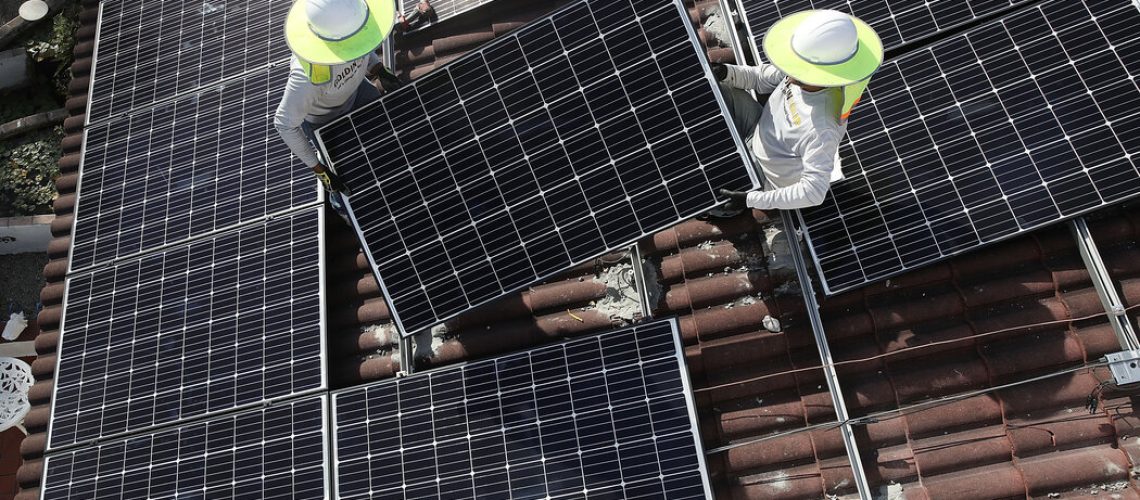To avoid the worst impacts of climate change, we have to make two big transitions at once: First, we have to generate all of our electricity from clean sources, like wind turbines and solar panels, rather than power plants that run on coal and methane gas. Second, we have to retool nearly everything else that burns oil and gas — like cars, buses and furnaces that heat buildings — to run on that clean electricity.
These changes are underway, but their speed and ultimate success depend greatly on one kind of company: the utilities that have monopolies to sell us electricity and gas.
But around the country, utility companies are using their outsize political power to slow down the clean energy transition, and they are probably using your money to do it.
State regulators are supposed to make sure that customers’ monthly utility bills cover only the cost of delivering electricity or gas and to set limits on how much utilities can profit. But large investor-owned utilities, with legions of lawyers to help them evade scrutiny, bake many of their political costs into rates right alongside their investments in electrical poles and wires. In doing so, they are conscripting their customers into an unknowing army of millions of small-dollar donors to prolong the era of dirty energy.
Fortunately, Colorado, Connecticut and Maine passed laws this spring that prohibit utilities from charging customers for their lobbying, public relations spending and dues to political trade associations like the American Gas Association and the Edison Electric Institute. Regulators in Louisiana are considering similar policy changes. Every state in the country should follow those leads.
These reforms are crucial because while all corporations in the United States can spend money on politics, in most cases, consumers who don’t approve can take their business elsewhere. Utilities — as regulated monopolies — have the unique ability to force customers to participate.
It’s not that utilities aren’t interested in building and profiting from clean energy. Many are doing so, and the Inflation Reduction Act offers utilities extensive tax incentives to increase their investments in wind, solar and batteries. But that does not mean that utilities want others to do the same. They will support a clean energy transition only if it happens exclusively on their terms and at their pace — a stance at odds with the scope and urgency of the herculean task of decarbonizing our electric grid.
Most electric utilities view distributed energy — technologies owned by customers that generate electricity in smaller amounts — as a threat to their business. They have tried for years to stop their customers in many states from investing in rooftop solar by rigging rates to make it less economically attractive. They’ve also funded opposition to policies that would speed clean energy.
Florida Power & Light spent millions of dollars on political consultants who are accused of engineering a scheme to siphon votes to third-party ghost candidates, according to reporting by The Orlando Sentinel. The ghost candidates never campaigned, but their names appeared on ballots for competitive State Senate seats in an effort to spoil the chances of Democrats who had been critical of the utilities. One of the Democrats had repeatedly introduced legislation supportive of rooftop solar power, which Florida Power & Light has crusaded against for years, including writing legislation in 2021 that would have slowed its growth. “I want you to make his life a living hell,” the utility’s chief executive wrote in an internal email. The legislator lost by fewer than 40 votes. Florida Power & Light has denied wrongdoing in the ghost candidate scandal.
Utilities also have also fought to cling to plants powered by fossil fuels as long as possible. In Ohio the utility FirstEnergy concealed $60 million in bribes through a web of dark-money groups to the political organization of the state’s speaker of the House. Before his conviction and sentencing for this instance of racketeering, he helped pass a law that secured a $1.3 billion ratepayer-funded bailout for FirstEnergy’s bankrupt nuclear and coal plants, gutted the state’s renewable energy and energy efficiency standards for utilities and bailed out coal plants owned by other utilities. Audits showed that FirstEnergy used money collected from ratepayers in its scheme.
Electric utilities have even opposed policies to hasten the development of desperately needed long-range transmission wires for clean energy, as NextEra Energy, Florida Power & Light’s parent company, spent millions to do in New England, where NextEra generates and sells power from oil and gas.
And many utility conglomerates don’t just sell electricity; they also sell methane gas, a serious threat to decarbonization efforts. Many of those gas utilities are fighting tooth and nail against local communities’ efforts to electrify our buildings and using ratepayers’ money to do so. In California, SoCalGas, the nation’s largest gas distribution utility, has been caught illicitly and repeatedly misusing ratepayer money to fight cities’ building electrification plans. In New York the gas utility National Fuel reportedly made its customers pay for advocacy materials directing New Yorkers to oppose pro-electrification policies.
The Colorado, Connecticut and Maine laws address these tactics by prohibiting utilities from charging customers for a suite of political activities. Other states and the federal government should go further in two ways:
First, they should add mandatory enforcement provisions so that if utilities illegally charge customers for political activities, stiff and automatic fines would kick in.
Second, policymakers should, at minimum, require that utilities disclose all political spending. The recently passed state laws won’t stop utilities from spending their profits on politics. The post-Citizens United campaign finance landscape makes it difficult to restrict such expenditures, but it does not protect companies’ ability to spend secretly, which is how utilities like FirstEnergy, Florida Power & Light and SoCalGas have attempted their most noxious influence campaigns.
Utilities are too central to the clean energy transition to be allowed to dictate our energy and climate policies based on their profit motives. Limiting their influence gives us the best chance to move quickly and affordably to a safer and cleaner future.






